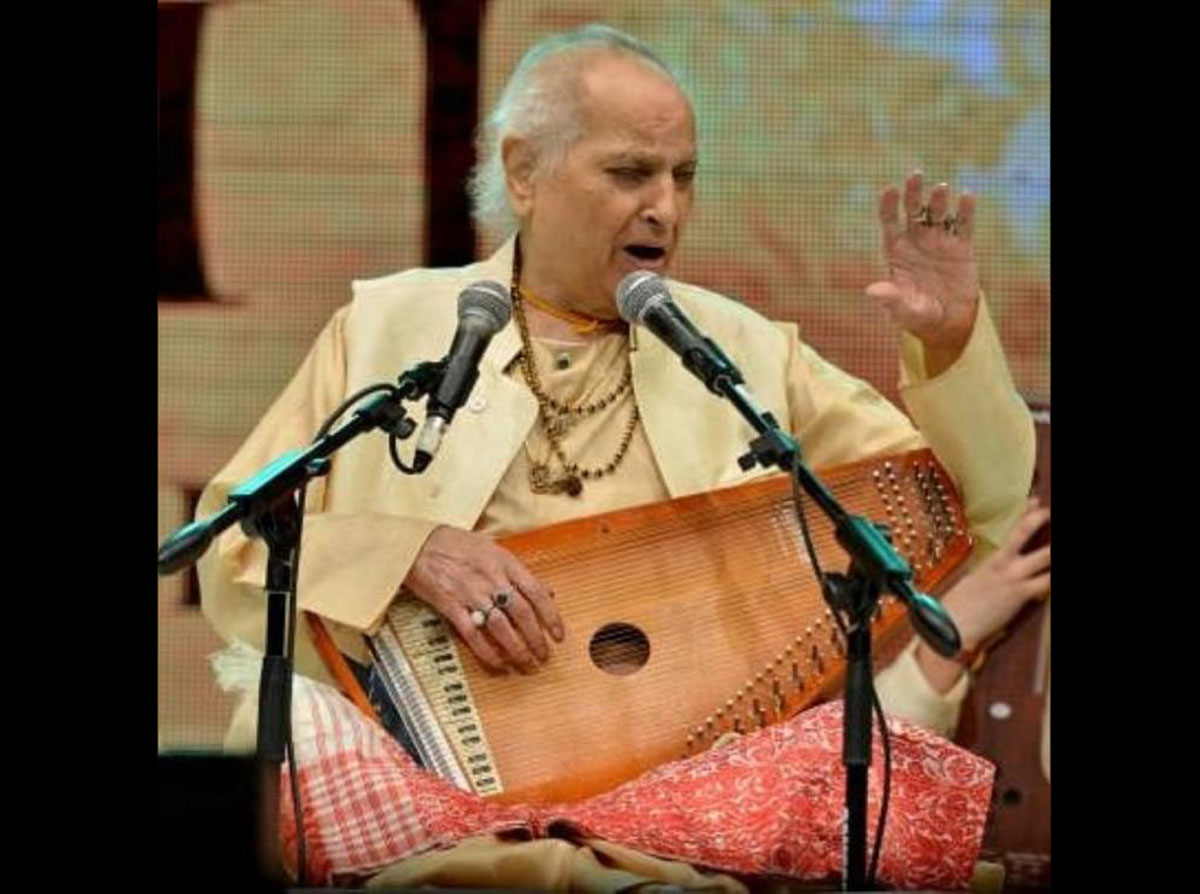Lalit Garg
Hindustani classical music has a special place in the world, as it is a proven and miraculous expression of the simultaneous worship of Satyam, Shivam and Sundram. We have read in history that when Tansen sang Deepak Raga, the lamp started burning automatically, when the Siddha singer of our regional music used to sing Megh Malhar, it would rain. Sangeet Martand Pandit Jasraj, such miraculous and voice magician, was fascinated by not only the nature but also the fauna and deer of the forest with the beautiful raga of his ‘Rasraj’. Living a meaningful life of ninety years, his singing has taken endless rest in New Jersey, America, his demise being the end of the era of Sankirtan tradition and Ashtachhap singing. His body is alienated from that great tradition of music, in which Navadha Bhakti has been sung in the traditional sense for thousands of years. His voice, classical singing and devotional songs ‘Om Namo Bhagavate Vasudevay’ and ‘Om Namah Shivaya’ are not only lost in the temples but have become the custom of prayer in every home-courtyard.
The creation of Pandit Jasraj, the exclusive worshiper of ‘devotional music’ in the tradition of Vaishnava-sankirtana in Hindustani classical music, and music is the aura of spirituality and creativity above entertainment and professionalism. The purpose of his music and singing is not to express self-expression, praise or influence anyone, but to have a sense of self-happiness, happiness, but godliness. For this reason, his classical singing and vocal practice are visible, crossing the boundary and moving towards the limitless. His singing is heartwarming and inspiring because he is comfortable and able to make every person drenched in devotion, shaking and cheering. This great artist who realizes the life of Lord Shri Krishna will maintain his indelible mark on the people of India through his classical-music practice for centuries.
The sound of Pandit Jasraj’s voice is that while listening to him, if a person feels peace in the crowd of tensions, then for someone’s restless mind, it is the sound of samadhi. If his devotional music and singing were the inspiration for concentration for the playful mind, then preaching of balance is in the moments of struggle. He was a divine and eccentric consciousness who would awaken himself to musical devotion and try to light the flame within innumerable listeners. His early treatise ‘Ujjwal Nilmani’ as he had practically made the path of his art work. The idea of his Mewati Gharana also spilled over into his singing for the last several decades with new meanings and motives. Whether he sang ‘Haveli-Sangeet’ or addressed Vedic chants by Narayan and Vasudeva, this unique singer everywhere walked on the path of classicalism, creating a folk path of devotion, from earth to universe, from music lovers to scientists Till, everyone kept an eye on the singing of this supernatural and unique musician, from politicians to seekers. In modern context Pandit Jasraj’s devotion to the link of the saintly and proven worshipers of classical singing is due to deep vacancy and a great emptiness in a great musical tradition. Be it Vrindavan or Nathdwara or other places of devotion – their lack will be felt for ages. Festivals and related events like Vasant Panchami, Janmashtami and Radhashtami will be incomplete without Panditji’s boisterous singing. Because he was the frontline singer of that first line, whose singing had a sense of coexistence with everyone. Everyone had the desire of Abhyudaya in his singing. Who always embraced the tradition of father Pandit Motiram and his elder brother, who was also his mentor, Pandit Maniram ji, in his singing, invented a lot of methods of classical music production by his satvic singing.
Pandit Jasraj was born on 28 January 1930 in Hinsar. When Jasraj was four years old, his father Pandit Motiram passed away and he was brought up under the patronage of elder brother Pandit Maniram. Jasraj spent over 80 years in the music world and received many major awards. He has taught music to many people in India, Canada and America. Some of his disciples have also become notable musicians. Panditji is survived by his wife Madhu Jasraj, son Sarang Dev and daughter Durga. In 1962, Jasraj married Madhura Shantaram, the daughter of film director V. Shantaram, whom he first met in 1960 in Mumbai. Inspired by Begum Akhtar, she adopted classical music. Jasraj started training as a singer at the age of 14, till then he was a tabla player. In his successful and meaningful musical journey of more than eight decades, Pandit Jasraj received honors like Padma Vibhushan (2000), Padma Bhushan (1990) and Padma Shri (1975). In September last year, a planet in the Solar System was named after him and he became the first Indian artist to receive this honor. The International Astronomical Union named ‘Minor Planet’ 2006 after Pandit Jasraj, which was discovered on 11 November 2006.
Jasraj devised a novel form of Jugalbandi, called ‘Jasrangi’, sung in the style of the ancient system of ‘moochhchana’ consisting of a male and a female singer who sing different ragas at one time. He is also known for presenting a variety of rare ragas including Abiri Todi and Patdipaki. In addition to classical music performances, Jasraj has also worked to popularize semi-classical music genres, such as mansion music, which include semi-classical performances in temples.


